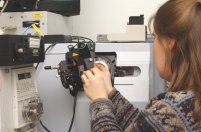Biomolecular mass spectrometry

- structure and sequence analysis
- unknown proteins
- post-translational modifications
- non-covalent complexes
- isoforms
Molecular weight determinations
It is important to define the analysis problem properly. Therefore, get in touch with us before sample preparation.
In general the samples need to be desalted. Possible solvents are:
- methanol/ethanol
- water
- acetonitrile
- formic/acetic acid
- occasionally chloroform, hexafluoroisopropanol
High-molecular weight proteins can be determined using MALDI-MS. Up to ~70 kDa electrospray analysis may be possible which delivers more accurate masses. This depends on the purity of the protein sample.
Identification of pre-separated (PAGE) proteins
The analysis is based on the enzymatic (mostly tryptic) digestion of the protein in the gel spot, extraction and purification of the peptides followed by MALDI-MS. The molecular weights of the peptides are then matched to an in silico digest of known proteins available in databases (NCBI, SwissProt).
Sample preparation
- fresh Coomassie-stained spots (Neuhoff et al., Electrophoresis 1985, 6, 427-448)
- avoid long storage
- careful spot excision (no protein-free spot border)
- do not dry spots
- avoid keratin contamination (from human and animal fur! Use clean scalpells!)
- zymography gels problematic, watch protein conzentration
- imidazol seems to cause problems
- DeStreak-reagent not recommended
- G250/aluminiumsulfat-stain (Kang et al. Bull. Korean Chem. Soc. 2002, 23, 11: 1511) may cause problems
- reduktion/alkylation recommended before 1D-PAGE, if disulfide bridges are expected

